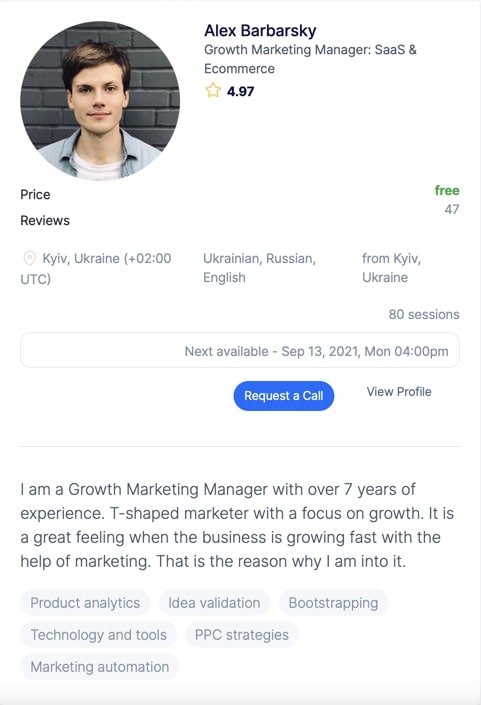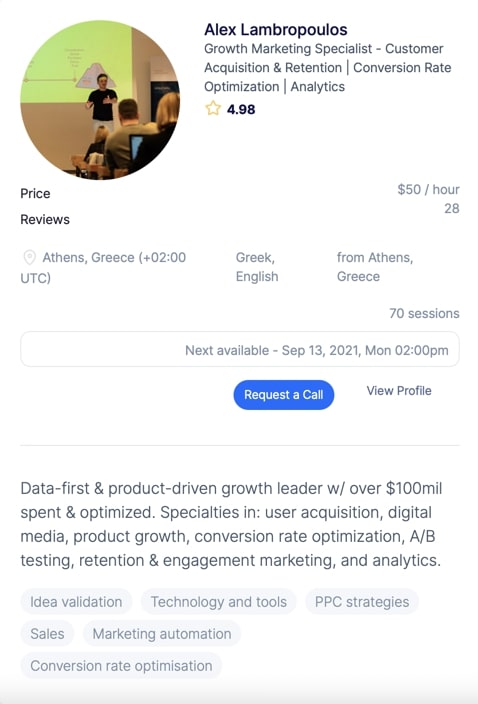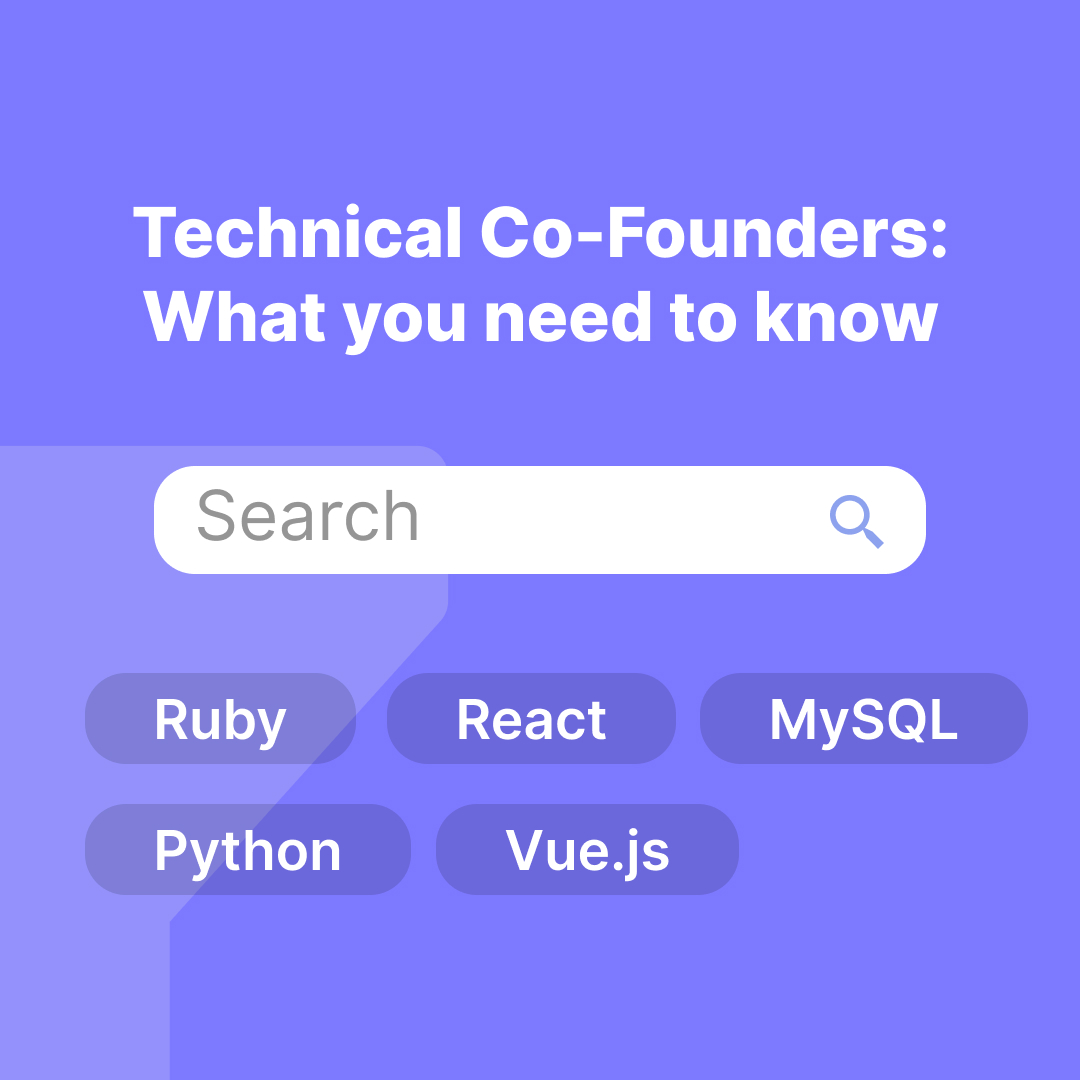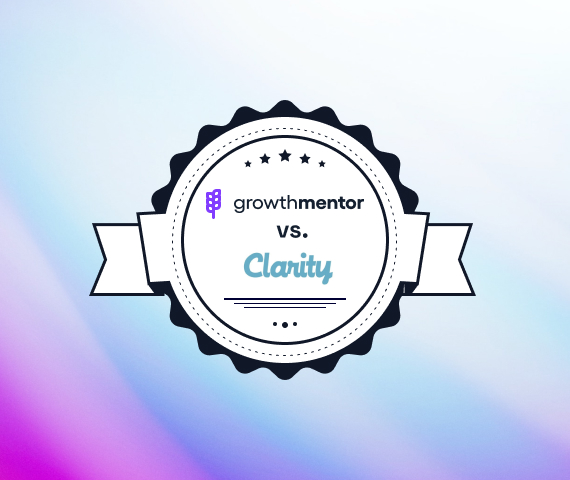The 5 Stages of a Startup (and how a growth mentor can help you grow at each stage)
Finding a startup mentor whose experience is a good fit for your startup’s current developmental stage has a lot of advantages. They’ll be better able to relate to your challenges and their ideas for growth and scalability will be more relevant to your current business reality.
For example, if you’re not swimming in millions of dollars of VC money and your startup is currently still in the MVP stage, you should be looking to get mentored by a founder with a lot of experience launching bootstrapped lean startups.
Not sure what stage you’re startup’s in?
The Five Stages of a Startup’s Lifecycle:
1. Ideation
What are the characteristics of this startup stage:
This is the very first stage of a startup in which the company itself is little more than an idea. If you don’t take action beyond this point, your idea will just sit there waiting for someone else to think of it and will never reach full maturity. At this stage, you want to be making sure that you’ve got problem solution fit.

Challenges of the ideation stage:
One of the biggest hurdles to overcome in the ideation stage is having a clear idea of the problem you’re trying to solve, and a clear vision of how your business/product will solve that problem.
And to solve the problem, you’ll need help choosing the best structure for your startup. An LLC is usually the best and most popular option, as it gives you infinite options to sell your product.
For example, if you’re thinking of a B2B SaaS application, you would want to thoroughly understand the workflow you’re trying to improve, and understand how solving that workflow’s issues impacts your potential clients’ businesses. To profit from this product, you’ll need to stick with a structure that allows for that, such as an LLC.
Ask yourself:
- Is the workflow issue a problem your potential clients are aware of?
- Is it a problem they would pay to fix?
- Will the impact of your “solution” be measurable? How?
Tips on finding a mentor to help during this startup stage:
- Consider someone with industry experience
- Don’t worry too much about skillset
- Can even use your own peers
- See if they have experience with blueprint mining value propositions.
If you’re looking for a mentor at this stage, and you definitely should be, consider looking for someone with industry experience that has the patience to brainstorm with you. Having someone that can challenge your assumptions will help you develop your ideas. This will be key to evaluating your business idea and more importantly to build a foundation that makes going from concept to action more feasible.
At this startup stage, any feedback can help you uncover perspectives that you haven’t considered. Even something as simple as talking to people in your peer group could be a useful way to flesh your ideas out and take you closer to building something concrete.
Suggested mentors for the startup ideation stage:
Alex Barbarsky
How they can help with ideation and validation:
Let’s face it – we can’t know everything, and we can’t predict the future. That is why we should use testing on each step of the startup journey. I am a big fan of a technique called smoke testing. We can use it to validate our startup idea, customers, positioning, landing page, etc. Just use it and you will be much more confident making your next step. I can give you advice on both a strategic approach and tactical test implementation.
Alex Lambropoulos
How they can help with ideation and validation:
How do you validate an MVP when going-to-market, or validate a new feature to your existing users? Which metrics and user journeys should you be focused on tracking, what questions should you be asking your users, and what insights and optimization opportunities can you extrapolate to fuel your roadmap? Throughout my career, I’ve focused on answering these key questions for early-stage companies, and would love to do the same for you!
2. MVP (Minimum Viable Product)
In the MVP stage you know the pain point you’re solving but it’s the “how” you’re going to solve it (technically and practically) that need refinement.
Screw up this stage, and you can burn through a lot of cash for no good reason.
At this point it’s important to set off cheap, and on the right foot. Choosing an appropriate platform and getting an idea of what tools you’ll need to use will take you a lot closer to a working prototype.
If you’re a non-technical founder, talking to a startup mentor with a strong technical background can help save you a boatload of money.
Get as much help as possible when deciding which framework(s) you’ll use to build your MVP. You definitely don’t need to start out with expensive custom builds and bespoke applications to get a working solution off the ground.
For example, the MVP of GrowthMentor was built using off-the-shelf software.
Our MVP consisted of:
- Zapier
- Slightly styled twitter bootstrap landing page
- Typeform
- Google Sheets
- Slack
- Shit-loads of coffee
Starting lean bought us time to properly validate our idea and also find the perfect team to build the Ruby on Rails app we needed to launch the final product.
3. Product-Market Fit
You know you’ve arrived at product-market fit if your customers would be sad if you went out of business.
It means that you’re solving a real pain point for enough people that your business is viable and has real growth prospects.
The good news is that if you achieve product-market fit, you’re ahead of most startups — because most startups don’t ever reach this stage.
The important thing here is not to get complacent!
As a startup you never have room to be resting on your laurels. You’ve built something that a lot of people appreciate, great! Now figure out how to make it better, how to keep the people who are using it happy, and how to get more people on board.
Start looking for mentors that can help you to experiment with the best growth strategies and marketing channels.

It’d be a shame to reach a stage where your customers absolutely love you, only to throw in the towel because you couldn’t find scalable and profitable acquisition channels!
You’ll want to find a mentor to help you get through this super stressful period of rapid experimentation.
The best mentors at this startup stage will help keep you organized, focused, consistent and above all else they’ll motivate you to keep pushing forward.
What’s important to realize is that you’re never really out of the product-market fit phase. The market is constantly evolving, so it follows naturally that the product must evolve as well.
Debugging Retention Issues:
On the flip side, if you’re past the early growth stage and have already built up a decent group of users but you’re starting to lose customers, you have a retention problem.
The first priority, in this case, is to diagnose the problem:
- Perhaps your value proposition is weak and/or positioning is misaligned
- Maybe your outsourced support team not up to par
- Maybe you have clear product issues (such as bugs or a bad user interface).
Whatever the problem is, you need to get it fixed.
If you’re startup’s facing these sorts of problems, even the best growth hacking mentor wont be able to save you.
It’d be like trying to fix a leaking bucket by pouring more water into it.
Instead, you’re probably better off looking for a mentor who’s an expert at reducing churn rates.
- They might be able to help you to set up customer success programs
- They might be a data scientist who can look over your help desk’s metrics and point out where the friction is.
- They might be an onboarding specialist who can spot weak value propositions in your first few onboarding mails
You get the point.
The key here is to understand that you don’t have a problem getting people to sign up, but that they’re probably not happy with something when they get over the initial excitement of buying your product. Figuring out what that is, and finding a way to fix it is certainly something that can be helped with a fresh and experienced set of eyes.
If you’re taking on a mentor to help you with customer churn, make sure they’ve got experience with customer service and relationship management. 90% of the time, it’s your customers that will tell you what’s driving them away.
4. Channel-Product Fit
After you (for real this time) have product-market fit you’ll want to focus on how to acquire more customers and scale up your acquisition.
In this case, the best kind of mentor that you can get is a real-life marketing practitioner with experience in paid ads, organic marketing and whatever other marketing channels might work well for your business.
By this point, you should already have a good idea about which marketing channels work well for you (i.e. PPC, SEO, social media, direct mail).
Now you’ll want to find someone who can help you to execute them while reducing your cost per acquisition. In other words, it’s time to drill down and get specific.
When it comes to growth, you’ll probably be deploying several strategies from blog content and referral programs to paid acquisition and outbound sales and it’s unlikely any single mentor will be the ideal sounding board for every strategy.
True, blue, full-stack marketers that can do it all are unicorns – and even if there are a fair few out there, their time is valuable and scarce.
It’s best then – at this point – to get specific. Develop your strategy in any one particular area and then bounce it off of someone who can drill down and give you actionable insights from the data you’ve collected over the course of your startup’s lifetime.
Lather, rinse and repeat this for every one of your channels and you’ll have a formidable multi-channel strategy polished and ready to scale.
5. Maturity
Once your startup has reached maturity, it’s no longer really a startup.
Instead, it’s a fully fledged business with a proven product and the right product market and channel market fit.
As a mature business, it’s likely you’ve got a team of people to handle the technical stuff in house. It’s at this point that you may be shifting your focus to higher level challenges. You’ll be looking into things like product development and diversification, organizational behavior and risk management.
Generally speaking, this is the time to be searching for a mentor who can guide you on leadership, and decision making on an organizational level. The perspective of a mature business shifts further into the future, and rather than rapid growth, you’ll be looking at sustained and stable growth over long periods of time. You may even be looking for a mentor that can guide you through the idea of working up to an IPO.
Look out for startup mentors who have proven experience with:
- Exit strategies Scaling
- Hiring Automating processes
- Product development
- Team building
- Creating departments
- Finance
- Fostering communication and corporate culture.
Remember that maturity isn’t the end, even though it’s the final stage on our list.
We emphasised in section 3 (product-market fit) that markets are constantly evolving. Part of the challenge of being a mature business is to constantly adapt to the markets in which you operate.
You’ll always need to re-calibrate and re-assess your strategic direction while making sure that the business units you’ve developed are still functioning both individually and as a group.This is a difficult thing to do and the people who’ve been at the helm of a proper business or two are the ones you should be looking to talk to.
Final Thoughts
The point we’re trying to drive home here is that starting and growing a business is a nuanced undertaking.
You’ll face different challenges at every point in the journey and that’s part of the thrill of being an entrepreneur.
The key to success is knowing what your startup needs to make it to the next level and having the confidence to make those decisions and turn them into action.
Similarly, knowing what kind of help you need and where to get it, will save you a lot of time, money and most importantly stress throughout the process.
Luckily, at GrowthMentor we’ve taken care of the “where” bit – it’s up to you to figure out the rest. (Just kidding, we can help with that too – just reach out to your account manager.)







